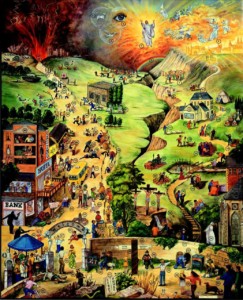The Narrow and the Wide Gate

In the Sermon on the Mount, Christ said “Enter by the narrow gate; for wide is the gate and broad is the way that leads to destruction, and there are many who go in by it. Because narrow is the gate and difficult is the way that leads to life, and there are few who find it” (Matt 7:13-14).
How are we to understand these words and apply them to our daily lives? Jesus is telling his followers that the main aim of our earthly life is to find the road that leads to “life”. True life is the Kingdom of God, being in the presence of God.
The wide gate and the easy road is the way of the world. St John Chrysostom in On Wealth and Poverty defines this as those “who have no care for self-control and give no thought for virtue, who wish to behave recklessly, who yield themselves to luxury and gluttony, who spend themselves every day in madness and frenzy for money, who strain after the things of the present life.” St John’s words still resonate strongly in our modern world.
Some people mistakenly think the difficulties in earning a living and accumulating wealth must mean that this is the narrow gate with the hard road: “it’s a tough world out there.”
Many people think that striving for the pleasures of this world will bring them happiness and contentment. Paradoxically, the opposite is the reality. Christ said, “take heed and beware of covetousness [materialism, greed or desire to accumulate possessions], for one’s life does not consist in the abundance of the things he possesses” (Luke 12:15).
The characteristics of those who enter the narrow gate and travel on the difficult road are the opposite of those outlined above. They strive for self-control, concern themselves with gaining virtues, do not long for luxury, moderate their intake of food and alcohol, do not have the accumulation of wealth as their main goal, and do not seek after authority, reputation or power.
St John Chrysostom tells us that we can identify such people by the good deeds in humility that they perform.
So the question remains, why would one choose the narrow gate and the difficult road? It is definitely contrary to the world and the opinion of the many who see it as foolish and backward.
There are many ways to answer this. Let’s look at the lessons of the Lenten Period and Pascha. Why do we fast, attend church services and give money to the poor during the Lenten Period? They are tools to give us insight into our weakness and provide a way to overcome our faults. These things are not an end in themselves. If they were, it would be worse than following the way of the world. We would become like the Pharisees.
We walk on the narrow path so that we can experience the joy of the living presence of Jesus, our personal Saviour. The great paradox is that this way of life is more satisfying than the earthly way.
The question that Christ poses to everyone, all of us, is how will I end up if I continue on the road I am on now?
Source: Lychnos June-July 2020 edition
